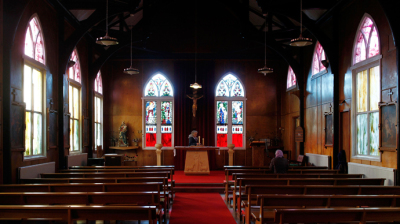Churches are relevant but not trustworthy: An unexpected, new perception gap

How do the unchurched really feel about the American church? Do these feelings differ from those who regularly attend church? The Church Answers Research team just completed a new, significant study to answer these questions.
We surveyed 604 people in the United States from a variety of backgrounds. We asked the same questions of two groups.
- Those who attend church regularly.
- Those who do not attend church regularly.
After comparing the two groups, we found new, surprising insights of the unchurched.
The unchurched believe churches are generally good for their communities
Both the churched and unchurched believe churches are generally good for their communities, with almost 6 out of 10 unchurched people agreeing or strongly agreeing. The general perspective of churches is far more positive than negative among the unchurched. Pastors and church leaders should not assume a pessimistic or negative attitude from those who are not regular in church. Indeed, there is reason for optimism.
But there is also a significant problem. A new perception gap has emerged among the unchurched.
The unchurched believe churches are still relevant but not trustworthy
A major surprise emerged in the data: Non-attendees view the church as more relevant today than churchgoers! We had to recheck this data several times because it was counter to many common assumptions. Here is what we found.
Among the churched, 40% agree or strongly agree that the church is largely irrelevant today, while only 27% of the unchurched believe the church is largely irrelevant.
But the issue of trust was a different story. Attendees generally trust their churches (81%) and pastors (76%), while trust levels were lower among non-attendees with churches (30%) and pastors (35%).
The dichotomy is fascinating.
- Churched people: I trust the church but believe it’s irrelevant today.
- Unchurched people: The church is still relevant but not trustworthy.
The unchurched seem to believe the concept and ideals of churches are helpful to communities, but the actual churches and current leaders cannot be trusted. They like the idea of the church from a distance but would rather not get close because of trust issues.
The churched seem to believe their churches and leaders are trustworthy because they are close to them. At the same time, a significant portion of them don’t think their church is relevant to others.
Why might this dichotomy exist between the two groups? We believe two major reasons are insularity and scandals.
1. Insularity: Only 1% of churches have an ongoing evangelism emphasis. How have churches grown in the last 25 years? For most, it was not due to evangelistic efforts and conversion growth. It was not due to biological growth. Transfer growth has driven most of it. As a result, churches are full of people who are long-time believers, with few new believers among them.
2. Scandals: Since the unchurched are not hearing from the churched, headlines and media reports sway their perceptions. Again, these perceptions are not necessarily negative (they believe churches are good for communities and think they are relevant today). The unchurched simply do not have a personal connection with churched people that helps build trust.
The perception problems of churches are both self-imposed and self-inflicted.
- Churches have a self-imposed perception problem not shared with the unchurched: “We’re irrelevant!”
- Churches have a self-inflicted perception problem swaying the perceptions of the unchurched: “We have scandals and cannot be trusted.”
Facts are our friends: While biblical doctrine will always offend some, the bulk of church perception problems are self-imposed, self-inflicted, and largely fixable.
Click here to download the entire report for FREE!
Originally published at Church Answers.
Sam Rainer is president of Church Answers and pastor at West Bradenton Baptist Church in Florida.




























